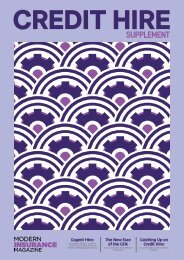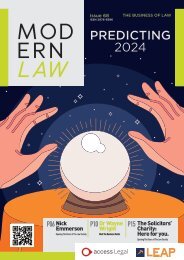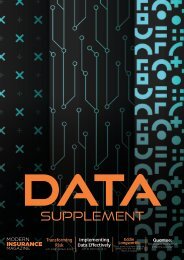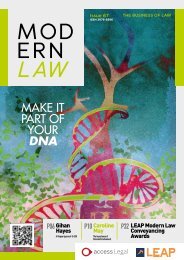Modern Insurance Magazine Issue 66
Insight: Unlocking Profitable Growth: Boosting Insurance Sales Efficiency by 18%, by Philipp Kaupke, Simon, Kucher & Partners Strategy & Marketing Consultants, Zürich Interview: Navigating a Complex Landscape by Richard Nash, Aon Interview: The True Meaning of Partnership with James Roberts, Europcar Editorial Board: Find out what our editorial board panel of experts have to say in this edition of Modern Insurance Magazine. Associations Assemble: Modern Insurance’s panel of resident associations outline the burning issues in insurance. The Fraud Board: Don’t miss our next instalment of The Fraud Board, where our growing collective of fraud experts convene to discuss the key factors affecting the fight against fraud in our industry today. FMG: Positive Cultures Attract Top Talent ParaCode: Do You Have A Healthy Relationship With Your Insurance Software Partner? Laird: Embracing Automation: Q&A with Nik Ellis Just a Thought with Eddie Longworth… ‘Groupthink’ Destroys Claims Integrity I Love Claims / ARC 360: Managing Expectations Amidst Cut-Back Cover Insurtech Insights: Interviews with Rob Newbold, Verisk; Franklin J. Manchester, SAS; Dr. Matthew Jones, Fathom; Charlie Sidoti, Innsure; Valkyrie Holmes, Faura; Dr. Maryam Golnaraghi, The Geneva Association. Insur.Tech.Talk Editorial Board: Experts from within the insurtech sector and beyond join us once more to share their unique insights
Insight: Unlocking Profitable Growth: Boosting Insurance Sales Efficiency by 18%, by Philipp Kaupke, Simon, Kucher & Partners Strategy & Marketing Consultants, Zürich
Interview: Navigating a Complex Landscape by Richard Nash, Aon
Interview: The True Meaning of Partnership with James Roberts, Europcar
Editorial Board: Find out what our editorial board panel of experts have to say in this edition of Modern Insurance Magazine.
Associations Assemble: Modern Insurance’s panel of resident associations outline the burning issues in insurance.
The Fraud Board: Don’t miss our next instalment of The Fraud Board, where our growing collective of fraud experts convene to discuss the key factors affecting the fight against fraud in our industry today.
FMG: Positive Cultures Attract Top Talent
ParaCode: Do You Have A Healthy Relationship With Your Insurance Software Partner?
Laird: Embracing Automation: Q&A with Nik Ellis
Just a Thought with Eddie Longworth… ‘Groupthink’ Destroys Claims Integrity
I Love Claims / ARC 360: Managing Expectations Amidst Cut-Back Cover
Insurtech Insights: Interviews with Rob Newbold, Verisk; Franklin J. Manchester, SAS; Dr. Matthew Jones, Fathom; Charlie Sidoti, Innsure; Valkyrie Holmes, Faura; Dr. Maryam Golnaraghi, The Geneva Association.
Insur.Tech.Talk Editorial Board: Experts from within the insurtech sector and beyond join us once more to share their unique insights
You also want an ePaper? Increase the reach of your titles
YUMPU automatically turns print PDFs into web optimized ePapers that Google loves.
INSURTECH<br />
SAS<br />
We<br />
Q<br />
Franklin, it was so great to catch up recently and<br />
talk about all things climate tech! You recently said<br />
that you believe AI will usher in a new era when it<br />
comes to the insurance community’s leading role in our<br />
larger, global ecosystem, particularly around existential<br />
challenges such as climate risk. Can you expand on your<br />
thoughts around how AI can enable climate resilience?<br />
A<br />
Sure! The speed and power of cloud<br />
computing, combined with innovation in<br />
AI, has finally delivered our industry to a<br />
destination where we can predict outcomes, prevent<br />
loss, and close the protection gap. We are living<br />
in the age of the ‘AI Exascale’, meaning the most<br />
powerful computers can perform the same number of<br />
calculations in one second than a person could make<br />
in 31.6 billion years.<br />
This is critical because the current situation is<br />
dire. However, we can harness AI to model better<br />
forecasts, and use this information to inform those<br />
communities most at risk. This can lead to the<br />
development of parametric products, which will keep<br />
those communities resilient.<br />
Q<br />
You recently shared an incredible case study,<br />
where the ‘smart city’ of Cary, NC adopted SAS’s<br />
cloud-based analytics in the prediction and<br />
response to flood risk. Do you see this regional approach<br />
being adopted in other states and municipalities? And<br />
at what rate, given how severe the climate crisis has<br />
become?<br />
A<br />
Sadly, 2023 was the deadliest year for climate<br />
related deaths since 2010, with more than<br />
75,000 fatalities globally. Cities like Cary or<br />
Jakarta are leaders in climate risk resiliency, yet there<br />
are not nearly enough communities exploring the<br />
use of technologies such as IoT, streaming analytics<br />
and AI to address these risks. I really hope to see this<br />
change, particularly because the global IoT market is<br />
forecast to grow to $700 billion by 2032.<br />
Q<br />
I believe you recently attended the RiskWorld<br />
Conference down in San Diego? On the back of<br />
this, what have you observed in terms of novel new<br />
trends around climate risk mitigation?<br />
A<br />
I observed many point solutions to individual<br />
issues or problems which were both innovative<br />
and impactful, adding immediate value.<br />
Practical solutions like flood barriers, carbon<br />
recapture products, or 3D printed fire-resistive<br />
homes address immediate needs; however, I believe<br />
the use of new data sources like aerial / space<br />
imagery ingested into AI platforms will be incredibly<br />
useful in forecasting and crafting emergency<br />
responses, as well as bolstering underwriting and<br />
claims decisioning processes.<br />
We also need to take a long-term view of addressing<br />
climate risk. There’s momentum in change, and<br />
individual solutions addressing today’s problems<br />
are the equivalent of taking an aspirin for pain<br />
management when you’ve got an arterial bleed.<br />
need to evaluate organizations based on their<br />
strategic vision and the role they intend to play in<br />
addressing climate risk. This involves directing premium<br />
dollars away from organizations with unsustainable<br />
business models or practices, and diverting to<br />
organizations with true ESG principles. Providing risk<br />
assessment tools to help those same entities craft a<br />
business plan to achieve their long-term goals also<br />
ensures compliance with climate regulation, and<br />
encourages the change we so desperately need.<br />
Q<br />
Can you share your thoughts on the importance of<br />
intersectional partnerships? Why is it important for<br />
re/insurers to be in collaboration with government<br />
officials, emergency response teams and commercial or<br />
residential real estate, as well as other sectors that might be<br />
affected by a natural disaster?<br />
A<br />
The insurance community is a part of a larger<br />
ecosystem upon which people depend.<br />
Reinsurers provide coverage to insurers, who<br />
can subsequently accept risk in the form of policies<br />
to cover homes and businesses. Those policyholders<br />
then have the support and assurances from state, local,<br />
and federal authorities to enact emergency response<br />
plans or adopt flood resiliency blueprints through<br />
their hard-earned tax dollars. We are part of a larger<br />
web and represent true sustainability! Resiliency does<br />
not exist without each member of this community<br />
taking accountability for their role and executing those<br />
responsibilities.<br />
Encouragingly, when disaster strikes, people help each<br />
other in the vast majority of instances. Every claim<br />
professional I’ve ever met has that one story about how<br />
they truly helped someone when it mattered the most,<br />
and I believe in our community’s ability to achieve<br />
resiliency for this very reason.<br />
As a self-described “<strong>Insurance</strong> Super<br />
Nerd,” Franklin leads the Market<br />
Strategy & Engagement for <strong>Insurance</strong><br />
within the Global Financial Services<br />
Industry Marketing team at SAS<br />
Institute, Inc.<br />
Prior to joining SAS in July 2022,<br />
Franklin held a variety of individual<br />
contributor and people leader roles<br />
in Property and Casualty <strong>Insurance</strong>.<br />
He is a Chartered Property Casualty<br />
Underwriter (CPCU) with bachelors’<br />
degrees in Finance & Banking,<br />
Risk & <strong>Insurance</strong> and French from<br />
Appalachian State University. He<br />
serves on the Board of Directors for<br />
the Women’s Center of Raleigh and<br />
the Board of Trustees for Soapstone<br />
United Methodist Church.<br />
Franklin J Manchester<br />
Global <strong>Insurance</strong> Strategic Advisor, SAS Global<br />
Industry Marketing<br />
60 | MODERN INSURANCE
















